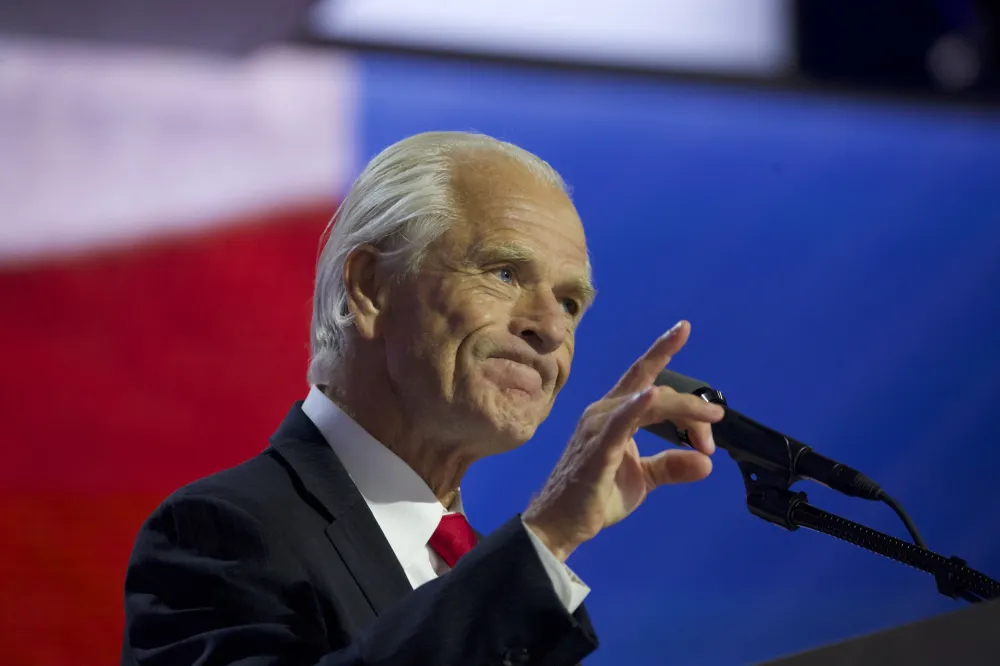Advertisement|Remove ads.
Trump Trade Adviser Navarro Urges UK To Avoid Becoming 'Dumping Ground' for Chinese Goods Amid Ongoing Tariff Talks

White House trade adviser Peter Navarro has cautioned the United Kingdom against deepening economic ties with China, warning that such a move could complicate efforts to ease U.S. tariffs.
In an interview with The Telegraph, Navarro criticized the UK for being “too compliant” with Beijing, adding that it should avoid becoming a “dumping ground” for Chinese goods.
He said that authoritarian regimes often use strategic gifts to spread influence, urging the UK and EU to resist these pressures.
Navarro’s comments come as UK Chancellor Rachel Reeves seeks tariff relief from the Trump administration while maintaining trade relations with both the European Union and China.
Reeves held talks with U.S. Treasury Secretary Scott Bessent last month, where she voiced concerns over tariffs on key products such as cars, steel, and aluminum.
While praising Trump’s stance on global trade imbalances, she also criticized China’s practices.
Despite ongoing trade talks, Navarro warned that the UK must address key regulatory hurdles, including food safety standards, if it hopes to secure tariff relief.
Navarro said that the U.S. would not tolerate high tariff or non-tariff barriers from any country, including the UK.
These trade tensions come amidst a broader shift in U.S. fiscal and energy policy.
U.S. President Donald Trump’s budget proposal calls for a $163 billion reduction in non-defense spending.
The proposed cuts focus on a variety of programs, including renewable energy initiatives and electric vehicle (EV) infrastructure, which Trump has criticized as ineffective.
The budget also includes substantial increases in defense spending, with a proposed 13% rise to $1.01 trillion for fiscal year 2026.
The budget proposes cutting over $15 billion in funding from renewable energy projects, including carbon dioxide removal technologies.
It also calls for the elimination of taxpayer support for EV and battery manufacturers and the cancellation of $6 billion in funds for EV charger programs, which it labels as ineffective.
The proposal further targets reductions in the Energy Efficiency and Renewable Energy program, cutting $2.57 billion from its budget.
Additionally, Trump has urged the Federal Reserve to cut interest rates following stronger-than-expected April job numbers, which showed a 177,000 increase in nonfarm payrolls.
The President called for rate cuts to maintain economic momentum, arguing that inflation is under control.
The SPDR S&P 500 ETF Trust (SPY), which tracks the S&P 500, and SPDR Dow Jones Industrial Average ETF (DIA), and the Invesco QQQ Trust, Series 1 (QQQ), which tracks the Nasdaq Composite, have all seen year-to-date declines of 3.1%, 2.5%, and 4.2%, respectively.
For updates and corrections, email newsroom[at]stocktwits[dot]com.












/filters:format(webp)https://st-everywhere-cms-prod.s3.us-east-1.amazonaws.com/large_adam_smigielski_K5m_Pt_O_Nmp_HM_unsplash_f365ee93f4.jpg)
/filters:format(webp)https://news.stocktwits-cdn.com/jaiveer_jpg_280ad67f36.webp)
/filters:format(webp)https://news.stocktwits-cdn.com/large_trump_jpg_fc59d30bbe.webp)
/filters:format(webp)https://news.stocktwits-cdn.com/Aashika_Suresh_Profile_Picture_jpg_2acd6f446c.webp)
/filters:format(webp)https://news.stocktwits-cdn.com/large_Getty_Images_1190665957_jpg_92088206ed.webp)
/filters:format(webp)https://news.stocktwits-cdn.com/large_Getty_Images_2235337192_jpg_56c00409cf.webp)
/filters:format(webp)https://st-everywhere-cms-prod.s3.us-east-1.amazonaws.com/unnamed_jpg_9dff551b50.webp)
/filters:format(webp)https://news.stocktwits-cdn.com/large_marvell_logo_OG_jpg_dfc748dd9b.webp)
/filters:format(webp)https://news.stocktwits-cdn.com/large_Getty_Images_2232147590_jpg_a31aecbfad.webp)